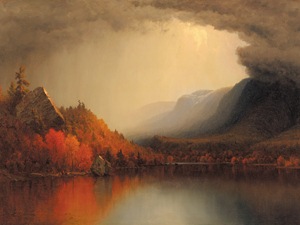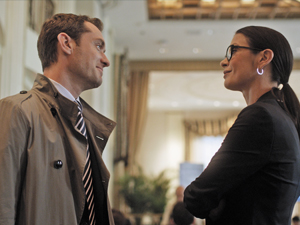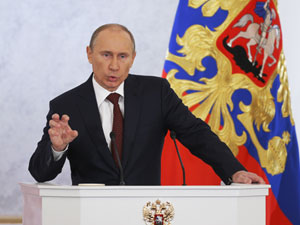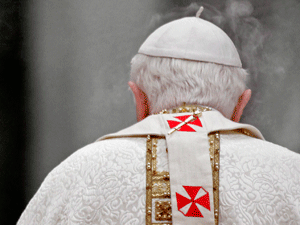
At War With Art At War With Art
The Smithsonian’s show on the Civil War and American Art expresses a deep unease about the relationship between between art and history.
Feb 19, 2013 / Books & the Arts / James W. Loewen
A Deliberate Pace: On Rachel Carson A Deliberate Pace: On Rachel Carson
On a Farther Shore captures the conservationist’s deep sense of geologic time and the forces of evolution.
Feb 19, 2013 / Books & the Arts / Vivian Gornick

Wild Things: What Was Abstract Art? Wild Things: What Was Abstract Art?
MoMA’s monumental exhibition recalls the time when abstraction affected people like love or revolution.
Feb 19, 2013 / Books & the Arts / Barry Schwabsky

Hollywood Ending? Hollywood Ending?
Steven Soderbergh’s Side Effects; Lynne Sach’s Your Day Is My Night
Feb 19, 2013 / Books & the Arts / Stuart Klawans
Puzzle No. 3273 Puzzle No. 3273
Click HERE to download a printable PDF of this puzzle. And don’t miss Kosman and Picciotto’s crossword blog, Word Salad. ACROSS 1 Act of giving new vigor to accelerate the translation into a Romance language? (14) 10 Plays music idly, upsetting old ones (7) 11 Opposite a Roman general, a Roman numeral (7) 12 Little men exclaimed, “I say, brother—you’re telling a fib!” (9) 13 Jumped with broken plate (5) 14 Express apology for garment (4) 15 Trying to return thanks: seductive (10) 18 Insecure before the onset of tooth decay? (10) 21 Sports league will not be allowing starters (4) 24 Cure apnea for a song (5) 26 River tree confused dog (9) 27 Guest of the first organized event featuring me as subject (7) 28 I’m American, having internalized animal energy (7) 29 Sarge is changing course (9,5) DOWN 2 Come apart over Cunningham’s online business (1-8) 3 Lives on the tip of Lanai and Oahu, for instance (6) 4 Strike a sailor in the ear (7) 5 Invent one devious enigma (7) 6 Mammal and insect slip away together (8) 7 Ancient locality is part of region, I assume (5) 8 Form of ID doorkeeper brought up (4,3) 9 Creeps cut the head off birds (6) 16 Eggs go bad when flipped under hotel pioneer (9) 17 Attractive Orlando team surrounding goal (8) 18 Pop-Tarts: they might be used in drug manufacture (7) 19 Redesign 14 with Yale student and Middle East native (7) 20 Releasing agreement with inventor’s initial at the end? No good (7) 22 A hybrid alternative to down (6) 23 Weakling with large ecstasy habit, in part (6) 25 Concluding words in outspoken voice (5) SOLUTION TO PUZZLE NO. 3272 ACROSS 1 ABSO(LUTE)LY (LA boys anag.) 6 hidden 10 DOG + MA 11 anag. 12 CERTAINL + Y (clarinet anag.) 13 hidden 14 2 defs. 16 anag. 19 ORP(HAN)A(G)E (opera anag.) 21 rev. hidden 23 DRE + AM 24 O + KEY + DO + KEY 26 DISC + RED + IT 27 A + TRIA[l] 28 AID + A 29 anag. DOWN 1 AB + DUCT 2 rev. 3 LE(AKA + G)E 4 TAR(ANT)UL + A (ultra anag., &lit.) 5 LO + AMY 7 LA TE(CO)MER (rev.) 8 O + FCOURSE (refocus anag.) 9 [s]TIFFIN[g] 15 2 defs. 17 EL + EM + EN + TAL[k] 18 GOO + DID + E[xtr]A 20 AD + MIRE 21 dream is anag. 22 BY + PASS (spas anag.) 24 alternate letters 25 KAR[t]MA (rev.)
Feb 19, 2013 / Joshua Kosman and Henri Picciotto
Exchange: ‘Stripping Down and Lighting Up’ Exchange: ‘Stripping Down and Lighting Up’
San Francisco Steve Wasserman has taken liberties with history and with my book, Subversives: The FBI’s War on Student Radicals, and Reagan’s Rise to Power [“Exit Stage Left,” Oct. 29, 2012]. Wasserman, a former Berkeley radical, opens his essay with an anecdote from 1969. He’d spent the day “battling cops” trying to quell a protest at UC Berkeley, and that evening attended the Living Theatre’s Paradise Now, a performance meant to shock with its outré references to pot and sex. Some in the audience disrupted the show by stripping down and lighting up (though Wasserman demurely doesn’t say if he joined in). “Bedazzled as we were by the spectacle of our own high ideals and the intoxications of making history,” he writes, “we perhaps might be forgiven for mistaking the theater in the streets as the main event.” This episode may reflect Wasserman’s experience of late ’60s Berkeley, but not the broader period I examined or the role of most students, professors and university officials targeted by the FBI. Subversives tells the story of J. Edgar Hoover’s covert operations at the University of California during the Cold War. It starts with the FBI’s investigation of Soviet nuclear espionage at Berkeley in the ’40s and shows how the bureau veered from this mission to focus on citizens engaged in constitutionally protected dissent. The book does this by tracing the FBI’s converging involvements with three iconic figures who clashed at Berkeley in the ’60s: the ambitious neophyte politician Ronald Reagan, the inspiring student leader Mario Savio and the liberal university president Clark Kerr. As the prologue notes, “It shows how the FBI’s dirty tricks at Berkeley helped fuel the student movement, damage the Democratic Party, launch Ronald Reagan’s political career, and exacerbate the nation’s continuing culture wars. Above all, it illustrates the dangers that the combination of secrecy and power pose to democracy, especially during turbulent times.” Wasserman shoots past all this, writing, “Did the bureau, despite its legal, extralegal and often criminal manipulations, actually bend history’s arrow? For all its provocations, did it really derail or significantly disrupt the New Left? Did it truly succeed in putting the kibosh on student protest? Was it an important factor in propelling Reagan to the pinnacle of power—a summit to which he somehow might not, on the strength of his own political genius, have risen? The answer, contre Rosenfeld, is no.” “History’s arrow” is a nice conceit, but history is not one archer and arrow but many archers and arrows. And in many instances, Hoover’s hidden hand did alter the arrow’s arc. Consider some 1,000 professors dismissed without due process under the FBI’s unauthorized Responsibilities Program in the ’50s. Or Kerr, whom Hoover undermined with the public, the regents and President Johnson, who dropped him as a cabinet candidate. Or the FBI’s steady leaking of allegations to political and media allies, which darkened public opinion of UC and helped build a conservative consensus, both of which benefited candidate Reagan. I don’t claim that the FBI “significantly disrupted” the New Left or put “the kibosh” on student protest. I do show that the FBI’s dirty tricks not only failed to stop the Free Speech Movement and other protests, but backfired and strengthened the student movement. Thus, Hoover inadvertently drew Savio to Berkeley. Nor do I say Reagan won office because of Hoover. I show that Reagan was an active informer in Hollywood, that Hoover repaid him with personal and political favors, and that this covert—and improper—relationship significantly influenced Reagan’s political transformation. Absurdly, Wasserman suggests I believe everyone named in FBI records was involved in un-American conspiracies. I make clear that the bureau focused on legitimate protest. (He even misses the title’s double entendre.) He complains I lack irony, but he’s being a trifle farinaceous. One needn’t begin passages with a neon “Ironically….” The facts speak for themselves, and readers may conclude certain events are “ironic”—or are the logical result of a dictatorial director demanding agents validate his undue obsession with subversives. Beginning my research in 1981, I knew Senator Frank Church had exposed FBI activities elsewhere, and I was inspired to investigate them at Berkeley. I brought five FOIA lawsuits over twenty-seven years and forced the FBI to release 300,000-plus pages. Wasserman suggests the FBI tried to thwart their release because they reveal the bureau’s “thoroughgoing incompetence.” Amusing, perhaps, but the courts overruled FBI secrecy claims after finding the investigations unlawful. As the judge concluded, “The records in this case go [to] the very essence of what the government was up to during a turbulent, historic period.” But contrary to Wasserman, I didn’t rely solely on them but also conducted more than 150 interviews and other research. Was the systemic political corruption of the FBI really a “sideshow” to the New Left’s protests? Many might say just the opposite. Why did Wasserman so bend his review? Is he still “bedazzled” by his own spectacle? Or is his motive manifest in his conclusion: “But we did not need Hoover’s hooligans to prompt us to embrace the terrible logic of politics as a total art form. We came all on our own to believe that only by increasingly provocative spectacle could the veil of public apathy be pierced. It is we who elevated extremism to the level of strategy. It was a dialectic of defeat.” Such “extremism” may have contributed to the New Left’s decline, but it wasn’t the style of most activists during the Cold War; and other forces may have played a greater role, including the end of the Vietnam War. And who’s to say the loose amalgam of the New Left was meant to become a political institution, as Wasserman suggests. There’s a strong argument, too, that the era’s tumult led to a more democratic society. But as Wasserman makes clear, his true aim was bashing the ’60s and indulging in public self-renunciation; perhaps he did get naked. SETH ROSENFELD Wasserman Replies New Haven, Conn. Gosh. Seth Rosenfeld is an exemplary reporter. Subversives is, as I wrote, “welcome,” “important” and “adds nuance and appalling detail” to our sense of the ’60s, “whose many tumults and contradictions still lie buried beneath a carapace of cliché.” I added, “Rosenfeld’s labors help to deepen our understanding,” and I praised his “admirable dedication” to exposing what the FBI tried to hide. Rosenfeld’s aggrieved letter gives me a chance to go further: his book is indispensable though flawed (how and to what degree are matters reasonable people may reasonably disagree about). Still, I urge everyone to read it—without, however, checking your critical faculties at the title page. Read it with an open mind, but not so open that, as the old adage warns, your brains fall out. STEVE WASSERMAN
Feb 19, 2013 / Seth Rosenfeld and Steve Wasserman
Remembering Don Shaffer Remembering Don Shaffer
An original long distance runner, in Michael Harrington's term.
Feb 19, 2013 / Daniel Cantor

How Obama Can Avert Another Cold War How Obama Can Avert Another Cold War
The president should stem growing tensions with Russia to earn its cooperation in combating terrorism and nuclear proliferation.
Feb 19, 2013 / Stephen F. Cohen

Happy Birthday, Mr. Fortieth President! Happy Birthday, Mr. Fortieth President!
In a belated birthday wish, a reminder of how morally obtuse Ronald Reagan could be.
Feb 19, 2013 / Rick Perlstein

A New Pope—African, Latin American, Woman, Nice Guy—Will Change Nothing A New Pope—African, Latin American, Woman, Nice Guy—Will Change Nothing
If the Catholic Church is to change, the first thing that needs to happen is no pope, and certainly not an infallible one.
Feb 19, 2013 / Frances Kissling
